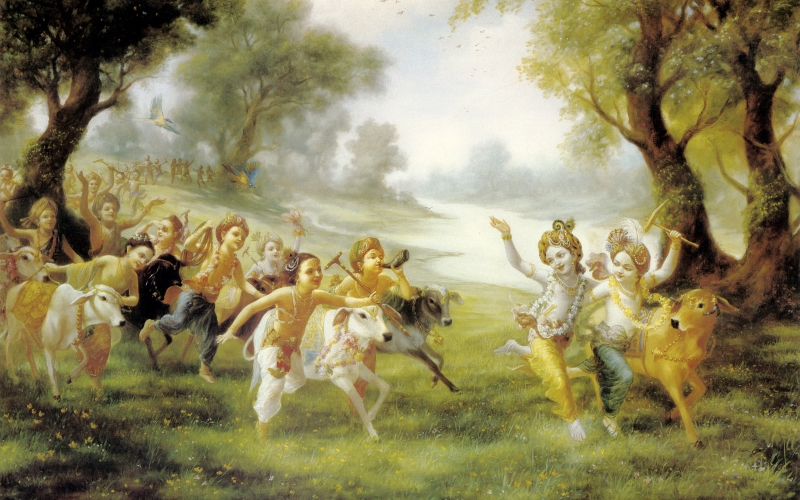In the mundane world, there is always the influence of time, which changes things from one stage to another, and the living entity, originally being avikara, or unchangeable, suffers a great deal on account of changes due to the influence of time. The changing effects of eternal time are conspicuously absent in the immortal kingdom of God, which should therefore be understood to have no influence of time and therefore no fear whatsoever.
Srila Prabhupada From Srimad Bhagavatam 2.6.18
Download Video (Right Click And Save Link As)


great video thank you ! haribol!
Thank you Prabhuji!!!
Hare Krishna! How are you doing Prabhu? Hope all is well.
I am good Prabhu….. How are you keeping?
Glad to hear. I’m doing fine. I still follow your great seva from time to time.
Thank you Prabhu. If you ever wish to help with videos again, please let me know. Keep well always my dear friend.
These beautiful and sweet paintings of Satya Yuga children, being able to be so free and innocent, with only the love of the divine in their heart and mind! Lovely and appreciated!
Hari, Hari Krishna! In deep appreciation Mukunda dasa!
this gives the heart and the soul butterflies; beautiful!
+wishing you and everybody a great new year!
Happy New Year to you Cindy. Hare Krishna. Jaya Prabhupada.
Bravehearts
And now for something completely different:
“The Hebrew name of G-d is Yah and it was known to be the name of G-d since Moses’s mythical exodus from Egypt, and by the way, what was the name of Egyptian Moon God? He was called Yah, coincidence? Yah equals to Iah or Ieue as it is said in Hebrew. One Egyptian papyrus says:
“I am Moon God Yah among the Gods, I do not fail.” Interestingly, when Christians praise their G-d they use the word “Helelu-Yah,” which means “O Yah the Shining One.” The word “Helel” means “Shining One.” But the similarlties does not end here.
The Hebrew word for Moon itself is “Yah-re-ach” meaning “Crescent Moon.” (H3394) And ‘Yareach’ is a Hebrew name for none other than the Canaanite deity Yarikh!
This Egyptian deity called ‘Yah’ was once personified through the crescent moon, worshiped in humanoid form.
The word Jerico or Yah-richo in Hebrew means Moon City. So they prayed to Moon God, otherwise it makes no sense to name a city base on pagan deities.
Strong Lexicon gives a very interesting meaning for Yareach (H3394): Yah (Moon) Re(Sun) Ank (Light).
If Moon God ‘Iah’ is not the same as Hebrew YAH then try explaining why so many Hebrew names end like:
Ab-iah , Ahaz-iah, Amar-iah, Ana-iah, Azaz-iah, Bena-iah, Bit-iah, El-iah, Hilk-iah, Hezek-iah, Isa-iah , Jecon-iah, Jerem-iah, Jos-iah etc.
World renowned Egyptologist, E.A. Wallis Budge, defined the Egyptian glyph “Aah” (Yah) as a moon deity in his Egyptian hieroglyphic dictionary and equated it directly to the Hebraic word Yareach
The oldest Egyptian deity Osiris (Asar) is personified with the moon as ‘Asar-Aah’ who the Semitic Hyksos revered as YHWH after their expulsion (biblical Exodus) from Egypt by the Nubian 18th dynasty after ruling it for over 100 years.
Among ancient references, we do seem to find in the Papyrus of Ani several references to the god, though here, his name has been translated as:
In Chapter 2:
“A spell to come forth by day and live after dying. Words spoken by the Osiris Ani:
O One, bright as the moon-god Iah; O One, shining as Iah…”
Even in the Theban royal families the name of the god Yah was incorporated into their names. The daughter of the 17th Dynasty king, Tao I, was Yah-hotep, meaning “Yah is content.”
In the tomb of Tuthmosis III of the 18th Dynasty there is a scene where the king is accompanied by his mother and three queens, including Sit-Yah, the “daughter of the Moon-god.”
A powerful god of one region was often taken by another, including the Egyptians, and almost completely redefined. And this is how our own fictitious YHWH was born, i.e. as an amalgamation of various pagan deities.”